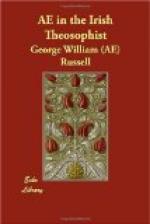Theosophy, to put it as concisely as possible, accepts the universe as “the unfolding of a Divine life, functioning in every form of living and nonliving thing.” Man is viewed as a compound being, a spark of this divine universal spirit being clothed with the body. The immortal indestructible part of man consists of this spark of universal spirit, its vehicle the human spirit, and the mind or intellectual faculties. It uses as a dwelling the body, with its animal life, its passions and appetites, to which mankind is so prone to attach tremendous importance. The connecting link is the mind, which, being full of agitation, strong, and obstinate, senses all the material existence, is moved by the hopes and fears, and the storm of existence. The lesson, ever insisted on as having to be learnt, is that the lower part of man, the body, and its attachments, have to be conquered and purified; and the only way to teach it its true functions is by suffering; and when this is done, we shall have got somewhere nearer the goal, when we shall identify our consciousness with our true self, not with the illusion. The powers of the mind to sense all existence, and its relations towards the rest of our being as the connecting link, bearing the contact with external things towards the soul, and at times being the vehicle of the Wisdom which is one of the attributes of that which has no attribute: I say, then, these powers and relations of the mind, which one finds everywhere treated of in Theosophical literature, are the determining factors in the formation of our Ethics. And since, from Socrates down, we are taught that self-knowledge is necessary for guidance of one’s conduct, the knowledge of the mind and its capacities is at once shadowed forth as of immense value. It has at least three elementary powers—viz., the power of knowing, the power of feeling, and the power of acting. These powers, though distinguishable, are not separable; but rather when we distinguish knowledge, feeling, and action, what we call by these names will be found, when accurately examined, to be combinations of the three elements, differing only in respect to the element which preponderates. Locke would have us suppose that when I say “I know,” it means that an object is inserted into my consciousness as into a bag. But no bag could produce the phenomenon of knowledge. To produce it requires the putting forth of an active power, which we call intelligence. The knowledge of an object always produces in the mind some emotion with regard to it: this emotion is normally pleasure. Sometimes the difficulties which beset the acquisition of knowledge are so great and cause such dissatisfaction and pain that the mind is tempted to banish them, together with the object which excites them, from its consciousness. Knowledge and the emotions to which it gives rise induce those actions which are the result of the inherent activity of the mind stimulated by them. Thus we see that the antecedents of all action include intelligence as an active power: and Ethics, more particularly Theosophical Ethics, are seen to have practical value, and not merely a speculative interest.




